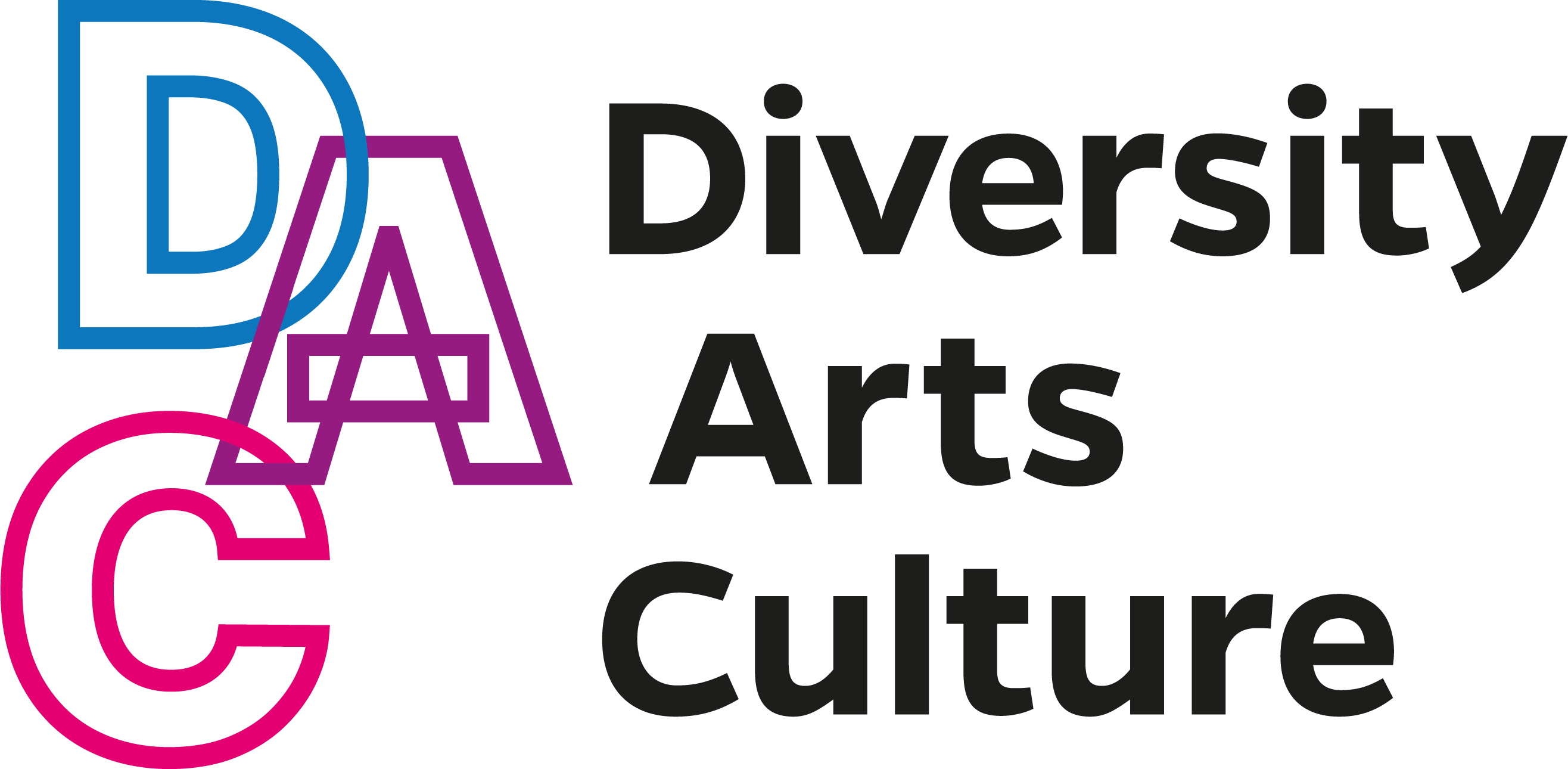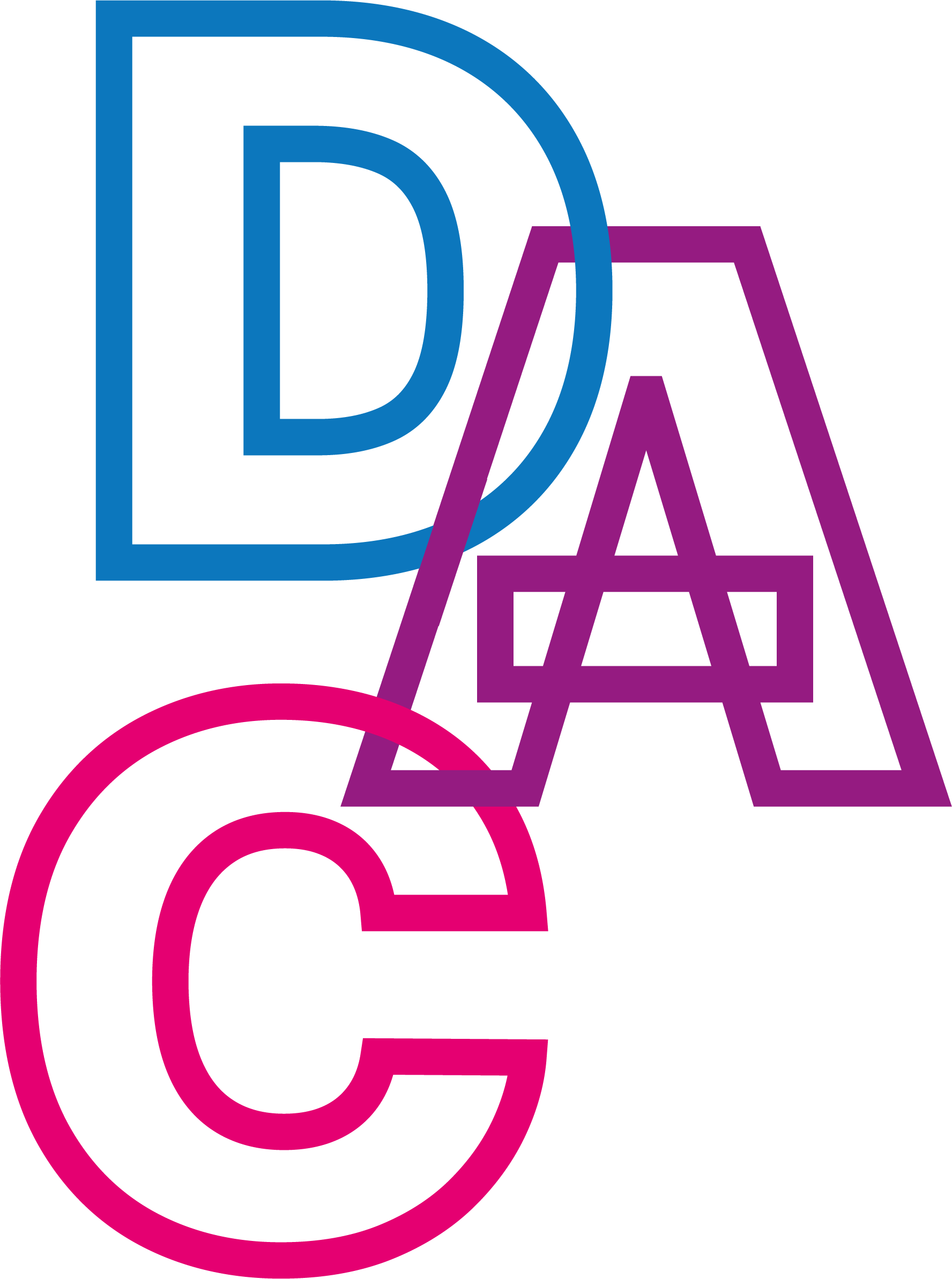Being a disabled person is a political act
Interview with Jess Thom
Jess Thom is a British performer, stand-up-comedian, author and the co-founder of Touretteshero, both her superhero alter-ego and artistic platform she runs with her team. Their first show, “Backstage in Biscuit Land”, became a big success and toured internationally. She also works as artistic programmer, did creative takeovers in cultural spaces like the Barbican and the Battersea Arts Centre in London and is well known as an advocate for Relaxed Performances. In Berlin she presented her theatre play “Not I” by Samuel Beckett in December 2018 at Sophiensaele.
Jess Thom has Tourettes, a neurological condition which makes her tic. Tics are involuntary, uncontrollable and often repetitive sounds and movements that can range from simple grimaces to uttering full sentences. Touretteshero was founded “to celebrate and share the creativity and humour of Tourettes with the widest possible audience”, which she does on her website: www.touretteshero.com.
In this interview the vocal tics are included in the text and highlighted by little arrows like this: >biscuit<.
Relaxed Performances provide a more relaxed atmosphere than the usual theatre setting. For instance, it will not be too dark in the audience, it’s permitted to come and go as you please and to make noises. Relaxed performances are a way to make the art accessible to people who might not enjoy the theatre experience otherwise, like young people, people on the Autistic Spectrum, with Tourettes or a Learning Disability, but they can be just as enjoyable for everyone else.
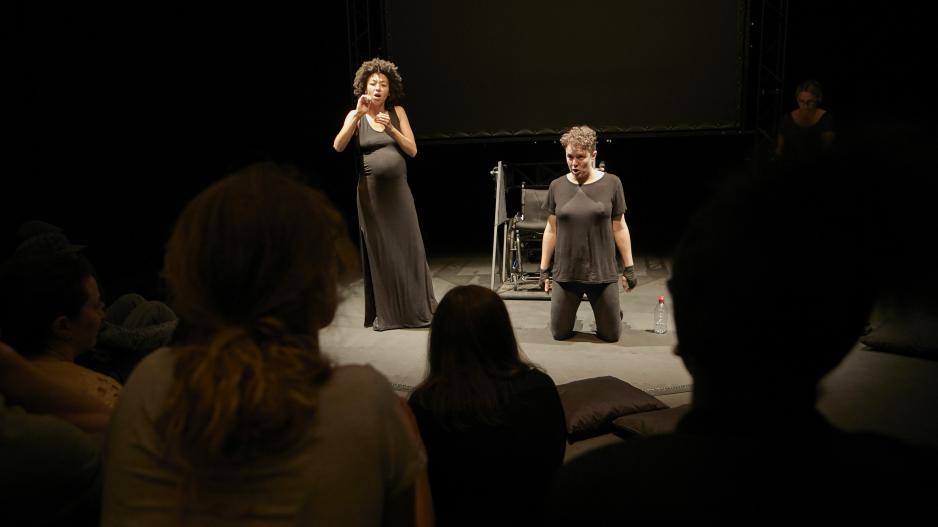
Diskussion nach der Performance von "Not I"
Interview by Carolin Huth and Lisa Scheibner for Diversity Arts Culture
Carolin Huth: You have an art degree and you have always been very passionate about art and culture, but due to your condition it has not always been easy to get access to the arts and to art institutions. It is difficult for you to follow the conventional theatre and museum rules and therefore you have been excluded a couple of times. How has that changed your relationship to art and art institutions?
Invisible Barriers
Jess Thom: >biscuit< As someone who has Tourette Syndrome and makes noise and moves about in ways that are non-normative, I have definitely found that lots of the conventions of our cultural spaces create invisible barriers for me: The idea that you sit in silence or that you aren’t allowed to leave an auditorium once you’re in there. Some of those ideas about how culture is enjoyed and about who it’s enjoying for have meant that my body automatically breaks with those rules. >biscuit< I can feel judged or discriminated against or feel really uncomfortable any time I go into a cultural space. >biscuit< Part of reclaiming and occupying those spaces as an artist was about finding ways to be in them that felt safer to me. But I don’t think you should have to make a show to feel safe in a theatre. Lots of the work that we make is about drawing >biscuit< attention to those invisible barriers or challenging assumptions. I strongly believe if you make work accessible or if you make it in an inclusive way then you make it stronger art. But despite the fact that I work in the arts, make theatre, speak publicly about my experiences, that doesn’t necessarily mean that it’s easy to go and see shows. To save on the workload of those negotiations for me to access spaces, we created an audience rider like: this is what I need from you as an artist to feel safe in your audience. I have requested three reasonable adjustments: that I was able to come in and out of the auditorium, that the staff knew I was coming and had a strategy for if people complained and that they made an announcement to the whole audience in the beginning so that my noise was acknowledged. At one time with a big show in London it took six hours of emailing and telephone conversations to have those adjustments met. That’s almost a full day of work to go and see a show. And I’m able to do that because I have the language to articulate my requirements, not everybody has that.
Are you ready to write me a list of who you don’t want at your show?
It got much easier when I started working at Battersea Art Centre on a methodology for what a relaxed venue could be. We’ve been working really closely to think about how you embed a relaxed approach to every piece of work, to every program. So rather than there being hushed silence for every show with the occasional relaxed performance, we say every show will meet the essential criteria for a relaxed performance unless there was a really strong creative rational why not. It means that people experience the show who wouldn’t have otherwise, but also it has benefits for the rest of the audience in terms of how comfortable people feel. There is this idea that if you relax the rules around theatre etiquette, there’s anarchy. And some people feel very protective of that. But what it’s really about is letting more people in and opening up that experience for different types of bodies and minds and I find it challenging if companies aren’t up for relaxed performances. Because: are you ready to start writing me a list of who you don’t want at your show? If you don’t want to do a relaxed performance then you’re saying that you don’t want me to see your work. So: who else don’t you want to see your work?
Accessible shows are about equality, not an act of charity
Relaxed performances, captioned performances, signed performances, I think people who don’t have this as an access requirement are sometimes a bit weary about them because they’re worried that it will spoil their experience of the theatre or a sense of “we can’t go and see that because we’re taking the space of someone who needs it”. What I really want to see is that happening with such regularity that theatre professionals and theatre audiences are very familiar with it and understand that it doesn’t massively impact on their experience if they go and see any of those performances. I would really like to see access requirements built into more shows. I hope that we’re moving away from it being seen as a nice thing to do for disabled people and more as an essential act of equality and something that is about diversifying and developing audience. And therefore, at a time where theatre is actually struggling for audiences, opening it up and seeing accessibility as an asset, I hope that idea is growing and strengthening. I do feel frustrated with the pace of that change. It’s not good enough to just know what a relaxed performance is, you also have to do it. Lots of big London theatre venues have beautifully worded information about relaxed performances on their website, and then you look at when they are next on and they are not holding any. If people know that that theatre etiquette is causing a barrier for lots of people, we need to do more to change it. I do feel very excited by how that is working in some places. But it is still up to individuals to be pushing that agenda rather than it being a consistent approach at making sure that everybody has access to our shared culture. Public money is funding it; therefore, it has to be accessible to the widest understanding of who the public is. >sausage!<
Venues and theatre companies really need to understand their responsibility to lead on that rather than just do it for the odd Christmas show because it feels kind. It has to stop being an act of charity and start being an act of equality. >hedgehog, fuck<
Carolin Huth: What conditions or influences have helped you to flourish as an artist and have boosted your career?
Jess Thom: Having commissioning funding and support from “Unlimited” was important. Unlimited is a scheme in the UK that commissions disabled artists. It focuses on high quality work, so it definitely is very demanding from its artists in terms of the rigor that they expect. But it is disabled led and therefore has a very deep understanding of barriers. I am an artist who strongly identifies as disabled which also has established my career as an artist in the UK. Conversations with professionals involved in schemes like “Unlimited”, having their support and understanding and access to other artists who have that experience has been really important to me. Basically, being part of a cohort of disabled arts professionals who have a deep understanding of what it is like to live in a non-accessible world, a peer group of artists at different stages of their careers, being able to look up as well as look down in terms of career growth, that’s been important.
Support, space and money for disabled led work
“Access to work” (a publicly funded support program) has been absolutely key to me being able to work as a disabled person and continuing to work as my body has changed. Social care funding keeps me safe at night, but without “Access to work” leading the way in terms of equalizing the playing field for me at work it would have been hard.
And the Arts Council taking the “Creative case for Diversity” and putting their money where their mouth is. I hope they continue to do that in terms of challenging organizations who aren’t taking an inclusive approach. Now we’re in a position to say that we don’t work with organizations unless they’re able to give us support, space and money.
“Unlimited” started in 2012 and in relatively short space of time has radically transformed the UK Art Scene for disabled artists and for mainstream venues in terms of their interest in disabled-led work. Programmers are going to be excited by high quality work whether that’s by a disabled person or not. My hope is that once they start seeing disabled artists as the producers and creators of work that shares different perspectives, the art will start pushing the agenda.
Carolin Huth: Disabled people in Germany are often put in the welfare box and mainstream art institutions often don’t feel responsible for anything related to disability apart from questions concerning accessibility for audiences.
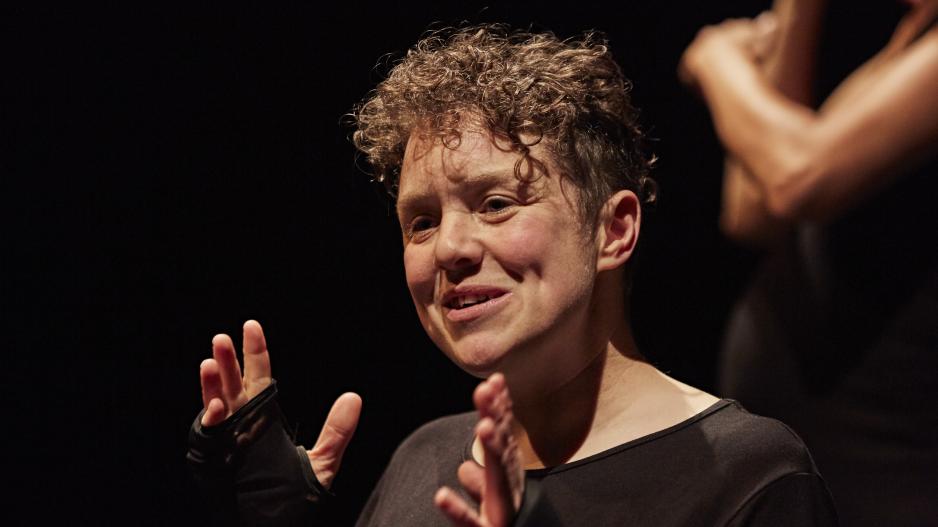
Jess Thom bei der Diskussion nach der Vorstellung von "Not I"
Art as a changer of minds
Jess Thom: That was an issue within the UK, but probably about ten years ago that was what disabled artists would have talked to you about. The only way that changes is through the work, through arts. Art is a much more convincing changer of minds than a scheme or person. The lasting change is about people suddenly feeling really excited by a piece of work. But then understanding that that comes from a sort of rich source, this isn’t one talented individual who has overcome their impairment to do this. People are disabled by systems, attitudes and environments and therefore the art that can come out of those experiences is powerful, persuasive and rich. From being involved in the “No Limits”-Festival last year I’m also aware that there are issues in Germany beyond the art system. It felt like disabled people perhaps didn’t have access to independent living or attitudes around disability were more paternalistic and those things have to be challenged too.
People need space and time to be creative and the support to be able to do that. And representation and visibility of difference in cultural spaces is important. I felt able to be an artist because I could see amazing performers like Mat Fraser or Liz Carr occupying those spaces.
Carolin Huth: That brings me to your art practice. What would you describe as your distinct aesthetic quality?
Jess Thom: >biscuiiits!< (all laugh) As a company we’ve been able to make art across disciplines. We hop between, often quite drastically, different art forms. We often work with humour: Our first show was warm and funny and engaging and accessible. Certainly “Not I” is different from that in that it is a neurodiverse presentation of a Samuel Beckett play so it’s taking an element of the canon, recognizing “Mouth” as a disabled character, reclaiming and understanding her experiences though the lens and perspective of disability.
Reclaiming Beckett’s “Mouth” as a disabled character
In terms of our aesthetic: Creating work that is not disabling to other people is important and that informs our aesthetic. We want to do that in a way that is creative and engaging, that serves the art. We’re very collaborative as a company and very interested in drawing in other disabled artists. Increasingly we’re interested in our performances being intergenerational so that conversations and interchanging experiences can happen across the boundaries of age, art form, and access requirement. >sausage!< >fuck it< >sausage<
Carolin Huth: In Germany art institutions as well as disabled artists quickly find themselves accused of supporting a freak show when showing art by disabled artists. Your work is also seen in a context of disability arts. Where would you draw the line between a freak show and disability art?
Who’s got the artistic power and the agency?
Jess Thom: For me the distinction is about who has power and agency. I am an artist making work. I work with a team that includes disabled and non-disabled people but we’re always very careful where the power lies, particularly about where the laugh and the gaze are located. My feeling is that if the work is disabled-led it’s very unlikely to go within the realms of Freak Show. Probably that says more about the nervousness of the audience than it does about disabled artists making the work. In the UK at the moment there are some incredible learning-disabled artists making phenomenal work about their experiences. And there is no way that that could ever be accused of being a Freak Show because the creative force of the artist is so present within those pieces. This is very much their work, often facilitated by other people, but it’s their creative inquiries at the centre. Audiences need to get comfortable seeing disabled bodies and understanding them beyond being a spectacle, something that you gaze upon without people having a voice or without agency. If you don’t see disabled people in public spaces, let alone on your stages or on TV >biscuit< or hear them on your radio, then of course you’re only going to see them as a curiosity and they’re going to be defined by their “exoticness” to you rather than by their talent. If people are worried about it being a Freak Show: Don’t look at the art, look at the audience. Why are they seeing it this way?
When we took on “Not I” we were very clear that we wanted to do a rigorous presentation and it would only work if it was very good. There was a risk I get a pat on the head for being a disabled person doing Beckett, or people saying, “It’s very good considering she has Tourette’s”. No. We wanted this piece of work to stand alone as a production, which I very much hope it does.
Lisa Scheibner: You’ve previously mentioned that to you the Beckett character “Mouth” was a neurodiverse character from the very beginning. I was wondering about your experience working with the character and the Beckett text, what resonated with you, what challenges presented themselves to you or did you discover anything unexpected?
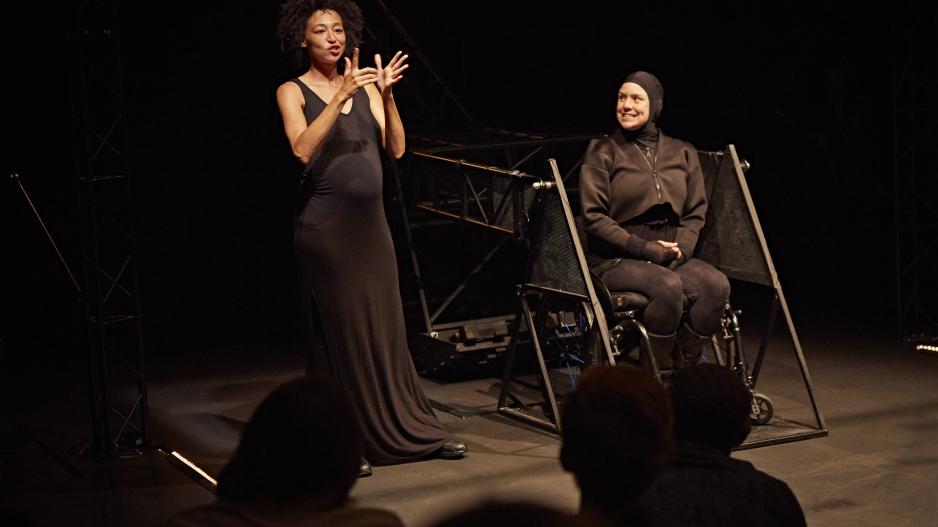
Intro der Performance "Not I"
Allowing people to take a creative risk without feeling unsafe
Jess Thom: I was introduced to the play “Not I” way before I became a performer or before we started Touretteshero. Matthew, my Touretteshero-colleague, introduced me to “Not I” at a time when >biscuit< my tics were intensifying and I was finding it hard to adjust and to recognize them as part of me or as product of my brain or my own language. I was very confused and challenged by it but also really intrigued. Eventually in a conversation with another theatre company we raised “Not I” and the fact that we had this long-standing interest in it and somebody around the table said: “The Beckett-estate would never give Jess the permission to perform “Not I”. I watched Matthew’s eyes and as soon as we came out of this meeting he said: “So what about ‘Not I’ then? I wonder how that works with the Equality Act”. >Biscuit< And when I started re-reading it, the thing that stunned me was how resonant it was for me. I’m not saying that this is a play about Tourette’s, but it’s absolutely a play about a character whose brain works in a non-normative way, who has experienced barriers in her life because of that. There are lines like, “whole body like gone” or “mouth on fire”, how she talks about being stared at, some of those things are so intertwined >biscuit< with my lived experience. I KNOW this character and I care about her and so it feels right that a neurodiverse performer takes on this role and that it’s made accessible to people who wouldn’t feel comfortable seeing other productions of it. Because I know that I wouldn’t have gone to see any of the other productions to date. I think there’s a big difference between taking a creative risk >biscuit< and seeing something that you might or might not like and taking a risk with an aspect of your identity and being at risk of discrimination in the space. We wanted to challenge the idea of what was possible for a relaxed performance. So taking the most intense piece of theatre and making it accessible in a way that doesn’t reduce the intensity but does allow people to take a creative risk without feeling unsafe. >biscuit, hedgehog, cats<
We make a world for one type of body and mind, which doesn’t really exist
Carolin Huth: Neurodiversity is a concept which is not very well known here in Germany. Could you explain neurodiversity a bit more? What do you mean when you refer to a character as neurodiverse? And in what ways is a neurodiverse person especially suitable for this play or role?
Jess Thom: All of our bodies and minds work in different ways. And that isn’t news, it’s always been that way. The reality is though, we make a world for one type of body and mind, which doesn’t really exist. Some people can fit into that, lots of people don’t. Neurodiversity is a way of reframing and re-understanding impairments of the brain. Instead of medicalizing a group of people, conditions like Tourette’s, Dyslexia, Dyspraxia, Asperger’s, Mental Health Conditions, Autistic Spectrum Disorders, can be just different expressions of how someone’s neurology works.
Mouth is a character who is practically speechless all her days but she then experiences these sudden outpourings of language that she doesn’t recognize as her own. For me that is an indication of someone whose mind is working differently. She also experiences barriers in terms of how people respond to her. There’s a whole section for example where she goes shopping and she just gives them the shopping bag with a list, she doesn’t even speak to anyone. And lots of people pointed to that saying: Look how isolated she is, look how weird it is how she shops. I read that and was like: Someone’s doing her shopping for her! Her community is facilitating her life. Someone is making sure she has what she needs and just because the way that she does it looks different, that doesn’t make it less valid.
We have not looked at how other people have performed this play, we have gone back to the stage directions and looked at how we can make it work for my body and for my mind. It is about understanding that people’s bodies and minds work differently. We can achieve amazing things but we don’t necessarily have to do it in ways that look the same. It can be very easy to be like: these are the ways that we do things rather than understanding that we can support people to find the ways that they need to do things in order to be successful, to participate, to achieve. >sausage!<
Being a disabled person is a political act
Lisa Scheibner: The character “Mouth” is often presented as a disembodied voice but at the same time she is really present and is re-creating herself while speaking and transgressing boundaries all the time, she’s unstoppable. Is there revolutionary or political potential in this not abiding by the rules?
Jess Thom: Absolutely, I often say that being a disabled person is a political act. My life is governed by politics, my ability to work, my ability to live, my ability to be happy rests on political decisions - particularly at a time when the UK is isolating itself. We very clearly say that Mouth as a character is only as isolated as her community makes her. There is a sort of rebellious, revolutionariness to Mouth. Mouth’s body is entirely present in what she is talking about: her muscles and her face and her tongue, she’s talking about the physical sensation of the buzzing. All of these things are like the denial and the absolute presence of body and the ridiculousness of that definitely feels relevant to the time that we are living in. And our message that we take from this play is one not of isolation, but one of companionship, of the need of community, of the responsibility of creating spaces, systems, societies, international networks, that are not disabling, that recognize the power of diversity and of difference. Our production ends with an invitation to the audience to make noise in solidarity with Mouth altogether, at the same time, but all different. And I think ultimately what we need to be looking for within our world and within our communities is ways for difference to be present, for the people to succeed without placing limits on each other. >bees!<
